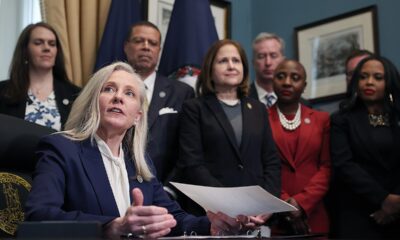Virginia
Glenn Youngkin withdraws Virginia from California's electric vehicle mandate

On Wednesday, Virginia Gov. Glenn Youngkin, a Republican, announced that at the end of the year, the state would no longer comply with California’s electric vehicle (E.V.) mandate.
“The idea that government should tell people what kind of car they can or can’t purchase is fundamentally wrong,” Youngkin said in a statement. “Virginians deserve the freedom to choose which vehicles best fit the needs of their families and businesses. The law is clear, and I am proud to announce Virginians will no longer be forced to live under this out-of-touch policy.”
California first adopted its Advanced Clean Cars (ACC) standard in 2012. The rules required automakers to gradually increase sales of zero-emission vehicles as a percent of total sales in California, culminating in an 8-percent share in 2025. Plug-in hybrids, which use both electric and gas-powered motors, counted for partial credit toward the total.
The Virginia General Assembly passed House Bill 1965 in 2021, which directed the State Air Pollution Control Board to adopt low-emission and zero-emission vehicle standards equivalent to California’s. The bill was signed into law by then-Gov. Ralph Northam, a Democrat, whose support helped guarantee the bill’s passage. Virginia is among 18 states and the District of Columbia that have adopted some or all of California’s regulations.
But the following year, California adopted Advanced Clear Cars II, which greatly expanded the requirements of the original standard. Under the new rules, the zero-emission requirement would jump from 8 percent of automaker’s sales for model year 2025 all the way to 35 percent in 2026, increasing each year until 100 percent of all new vehicles sold for model year 2035 must be electric.
The following day, Youngkin and the Republican-controlled Virginia House of Delegates indicated their intent to repeal H.B. 1965 and uncouple the state from California’s rules, but the Democrat-controlled state Senate squashed their efforts the following year. In the 2023 elections, Democrats regained control of the House of Delegates while keeping control of the Senate, and the state Senate once again defeated efforts to repeal the law in January 2024.
Ultimately, California’s more aggressive rules provided the legal justification for Virginia’s withdrawal. Youngkin’s press release claims that H.B. 1965 merely authorized the state to follow Advanced Clean Cars I, the rules in place at the time that went through 2025. “An opinion from Attorney General Jason Miyares confirms the law, as written, does not require Virginia to follow ACC II,” the press release continues. “Therefore, the Commonwealth will follow federal emissions standards on January 1, 2025.”
“We are alarmed that Governor Youngkin thinks that he is above the law,” Nicole Vaughan, communications director for the Virginia Conservation Network, tells Reason in a statement. “Legislation passed in 2021 directs Virginia’s Air Pollution Control Board to adopt Advanced Clean Cars and subsequent updates to the program. In doing so, Virginia exercised an option under the federal Clean Air Act to follow the more stringent standards adopted by California and several other states to address tailpipe pollution.”
“Virginia’s legislature chose to adopt Clean Car Standards in order to increase consumers’ access to electric vehicles, improve our air quality, and save lives,” Wyatt Gordon, senior policy manager for land use and transportation at the Virginia Conservation Network, told Reason in a statement. “To unilaterally pull our Commonwealth out of these shared standards is undemocratic, short-sighted, and wrong for Virginia.”
The federal standards, released by the U.S. Environmental Protection Agency in March, are less stringent than California’s but still anticipate that by 2035, more than 70 percent of new vehicles sold in the U.S. would be all-electric or hybrids. Even this is a daunting prospect, as E.V.s currently account for only 6.5 percent of all vehicles sold in the U.S.

Virginia
‘Explosions every day’: Virginia woman on her way to a wedding in India is stuck in Qatar

Arlington, Virginia, resident Anjali Sharma — stuck in the Middle Eastern since Saturday — documents her story on social media from a hotel in Doha, Qatar.
“I think it really hit me when I saw black smoke coming from afar on one of the buildings, and it ended up being a missile that got defused, and the debris fell on the ground and caused an explosion,” Sharma said.
She was on her way to a wedding in India and had a layover in Qatar when Iran’s retaliatory strikes began. The airspace in Qatar and several other nearby countries is closed.
Sharma is alone. She says the rest of her family she was supposed to meet with had their flights canceled.
She says it’s incredibly unsettling.
“I hear explosions every day,” Sharma said. “I hear planes going outside. I mean, I still hear military jets, right now. I don’t really know what that means.”
She is one of several thousands of Americans stranded in the Middle East. The State Department said it’s assisted almost 6,500 Americans since the conflict began.
Sharma says she hasn’t been able to get any clear guidance.
“I would just really appreciate it if the U.S. government could get clear guidelines of what they’re going to do to get us out and when that even may be,” she said.
U.S. Rep. Don Beyer, D-Va., has been critical of the Trump administration’s evacuation efforts. He says his office has heard from about 100 families whose loved ones are stranded abroad.
“The primary reason the State Department exists is to serve Americans living abroad, and they’re desperately failing at that, right now,” he said.
The White House said the secretary of state issued Level 4 travel advisories dating to January. But Qatar was not one of the countries given a do-not-travel advisory.
The State Department Wednesday created a new form for stranded citizens to fill out. They say it will provide departure information about available aviation and ground transportation options.
Sharma hopes it’s her ticket out.
“I just want to get out of here safely at this point.”
Virginia
Giants will hold 2026 training camp in West Virginia

The New York Giants will be forced to hold their 2026 training camp, the first with John Harbaugh as head coach, out of state.
Per a report from the New York Post, the Giants will hold what will likely be the first two weeks of training camp in West Virginia at the Greenbrier Resort, located in White Sulpher Springs.
Part of the reason for the move is the fact that World Cup games will be held at MetLife Stadium this summer. There is also ongoing construction at the Giants’ facility at 1925 Giants Drive. The Giants are expanding their locker room, weight room, dining facility and office space at their headquarters, constructed in 2009. That work began before Harbaugh was named head coach.
NFL teams have used the Greenbier extensively since 2014, when it was first established to host training camp for the New Orleans Saints. The Houston Texans and Cleveland Browns have held training camps there, and other have practiced there during extended road trips.
The facility has two grass fields and a FieldTurf field, as well as all of the other accommodations an NFL needs.
The Giants have trained at their own Quest Diagnostics Training Center in East Rutherford, N.J. since 2013.
Exact dates for NFL training camps have not yet been set, but the starting date is generally some time in late July. Per the Post, most practices at the Greenbrier are expected to be open to the public.
Virginia
Senate approves lawmaker pay raise as teacher pay hike stalls in Virginia budget talks

RICHMOND, Va. (WSET) — As the legislative session in Richmond comes closer to an end, lawmakers are still hard at work hammering out the budget for the year ahead. This year, the Senate has approved a pay raise for lawmakers after tabling bills that would have provided larger pay increases for teachers.
With the cost of living rising, teachers across Virginia have been watching the proposed budget closely and hoping for higher pay.
In February, a bill that would have raised teacher salaries by 4.5% each year until reaching the national average of $77,000 was tabled until next year. The decision left some educators disappointed.
“It’s definitely disappointing. We’re at a time where we are struggling to keep highly qualified staff in the buildings and in the profession, to be quite honest, because we have to compete with other industries,” Karl Loos, president of the Lynchburg Education Association, said.
SEE ALSO: ‘Strangest election cycle:’ Registrars prepare for referendum vote despite legal limbo
There is still a 3% increase for teachers included in the proposed Senate budget, and a 2% increase in the House of Delegates’ proposed budget. But Loos said a 3% raise only matches the rate of inflation, and will likely not be appealing enough to fill vacant positions.
“I think certainly teacher pay is a deterrent for a lot of people, especially as they see the amount of work that goes into it and the compensation for that work,” Loos said.
The Virginia Education Association also advocated for the 4.5% pay increase. Chad Stewart, the interim director of Government Relations and Research, said they believe budget uncertainty may have made lawmakers hesitant to commit to long-term increases they might not be able to sustain.
According to the State Fiscal Impact Statement, seen below, it would have required an additional $159.0 million in 2027, and increasing amounts for the next couple of years to meet the goal of reaching the national average.
“We’ve seen commitments going back decades from previous governors who have all stated they want to get the national teacher pay average, but no governor has ever delivered on it,” Stewart said.
Stewart said the average national pay for teachers they are hoping to meet is $77,000, and that the current average salary for teachers in the Commonwealth is around $70,000. He said ultimately it comes down to the budget, and he hopes in the following years teachers will receive that larger pay increase. Stewart said the organization hopes Gov. Spanberger will be the first to follow through on that promise.
Meanwhile, legislation that would increase pay for state lawmakers was passed in the Senate on Thursday. Republican Del. Tim Griffin of the 53rd District said he voted against the measure.
“I was outraged last week when they raised their own pay. I voted against it,” Griffin said. “When you run on affordability, I think people expected it to be more affordable for the people that live and work in Virginia, not for ourselves. It kind of defeats the purpose.”
When asked about the proposed pay increases in the House and the Senate, Campbell County Superintendent Clay Stanley said in a statement, “I am praying for 3%. Our teachers, at minimum, deserve a raise that matches the cost of living increase.”
ABC13 reached out to local Democratic lawmakers for comment on the teacher pay raise legislation, but did not receive a response.
-

 World1 week ago
World1 week agoExclusive: DeepSeek withholds latest AI model from US chipmakers including Nvidia, sources say
-

 Massachusetts1 week ago
Massachusetts1 week agoMother and daughter injured in Taunton house explosion
-

 Wisconsin3 days ago
Wisconsin3 days agoSetting sail on iceboats across a frozen lake in Wisconsin
-

 Maryland4 days ago
Maryland4 days agoAM showers Sunday in Maryland
-

 Denver, CO1 week ago
Denver, CO1 week ago10 acres charred, 5 injured in Thornton grass fire, evacuation orders lifted
-

 Florida4 days ago
Florida4 days agoFlorida man rescued after being stuck in shoulder-deep mud for days
-

 Oregon6 days ago
Oregon6 days ago2026 OSAA Oregon Wrestling State Championship Results And Brackets – FloWrestling
-

 Massachusetts2 days ago
Massachusetts2 days agoMassachusetts man awaits word from family in Iran after attacks























